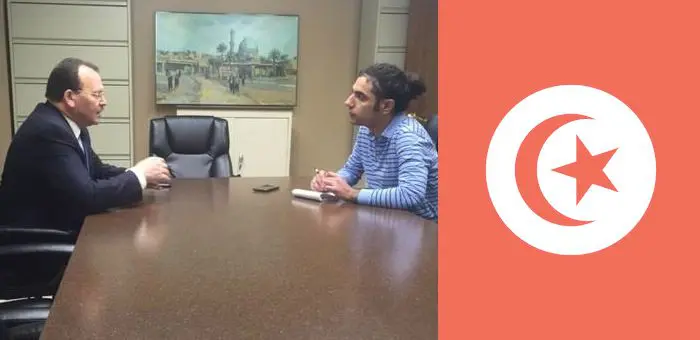
|
| Tunisian ambassador H.E. Fayçal Gouia (L) speaks to the AANews |
DEARBORN — While the “Arab Spring” has turned into a desolate winter across the Middle East and North Africa, Tunisia, the cradle of the 2011 popular revolts, seems to have completed a democratic transition that could set an example for rest of the Arab World.
H.E. Fayçal Gouia, the Tunisian ambassador in Washington, said good education, the large middle class, women’s participation and the homogeneous nature of Tunisian society were forces that contributed to Tunisia’s mostly successful path to democracy.
Former Tunisian autocrat Zine El Abidine Ben Ali was ousted by a peaceful uprising in January 2011. The Tunisian revolution proved to be contagious, as anti-government protests broke out in Libya, Egypt, Yemen, Bahrain, Syria and Saudi Arabia in what became known as the “Arab Spring.”
Most of these uprisings were subdued or turned into destructive civil wars that became catalysts for terrorism. However, Tunisia was able to draft a new constitution and freely elect a new parliament and a president, albeit after months of political deadlock.
The North African republic is still facing security threats by ISIS-linked groups based in Libya, its neighbor to the east. Last year, Tunisia suffered three major terrorist attacks that claimed 74 lives.
Gouia said the gains of the revolution cannot be undone by terrorists who want Tunisia to be a failed state.
“They want Tunisia to fail in its democratic transition and that will never happen,” the ambassador told The Arab American News last month. “We are solid in our commitment to democracy and liberty. Democracy in Tunisia is irreversible.”
Gouia said parties and individuals from across the political spectrum want to safeguard political freedoms in the country.
The ambassador acknowledged that Tunisia is facing challenges, but said the difficulties can be turned into opportunities.
“We have 300,000 unemployed young people who have university degrees,” he said. “Now, it is a challenge for the government to provide them with jobs. But at the same time, it can be a good opportunity if they can be active and contribute to the development of the country.”
Gouia said unemployment is a major issue, but terrorism remains the biggest problem.
Asked if Tunisia is safe, the ambassador said yes.
“But I would ask the question differently,” he added. “Is there any safe place or city or capital in the world, now? Who could say that Paris was not safe the last few months. In general, Tunisia is safe.”
The ambassador said Tunisian authorities are scrutinizing travelers going to Libya, where the chaos has provided a foothold for ISIS; but there is a balance between security measures and protecting people’s civil rights.
“What we did is control the passage to Libya and secure the border,” he said. “Libya, unfortunately, is a country where terrorism is flourishing because there are no institutions, no government.”
Gouia urged Arab peoples and governments to unite against terror.
“The common enemy to all Arab countries is terrorism,” he said. “If we succeed in our fight against terrorism, we will succeed in stabilizing our counties. We can further develop our nations and give hope to our populations.”
The ambassador said terrorism is an international threat that should be confronted by global collaboration.
Gouia described the U.S.-Tunisian relations as “extremely good.”
“President Obama praised the Tunisian revolution in two of his State of the Union (speeches),” the ambassador added. “We have solid security cooperation now between the two countries.”
Gouia said the Tunisian and U.S. authorities share intelligence information on terrorist networks.
“Tunisia was granted the status of a major non-NATO ally,” he said.
The Tunisian American community is around 25,000 people, according to Gouia. He said many of them work in the tourism and business sectors.






Leave a Reply